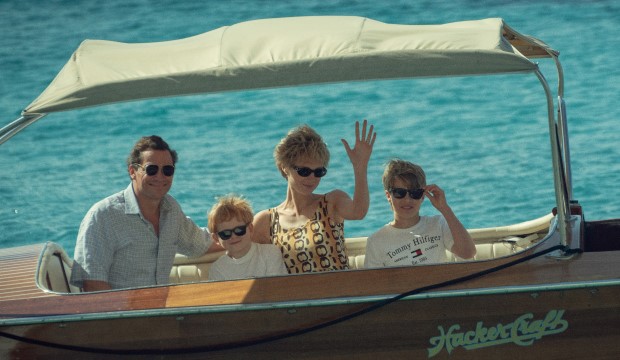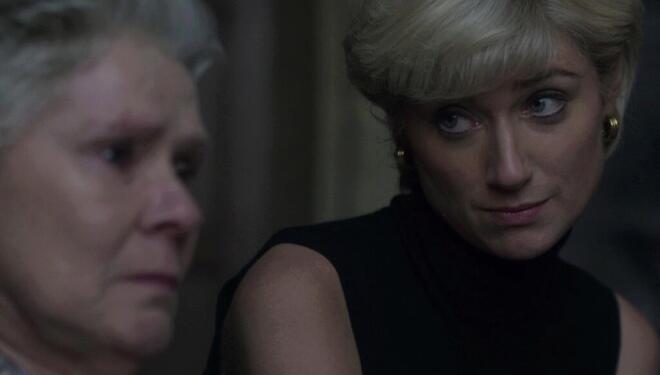
Scrutinising a show before anyone has seen it is predictably foolish, not to mention disrespectful to the programme-makers. The Crown’s fifth and penultimate season has engendered a famous gaggle of presumptive critics, turning the spotlight on themselves and denouncing episodes they haven’t seen. Mixed with their largely ill-informed opinions, emotions are still running high after the Queen’s death and the mourning that followed.
But what if this season is good and even (to an extent) respectful of the monarchy and our current King? The reality of this transparently fictionalised drama is that it’s more sympathetic than non-viewers might realise.

Left to right: Dominic West, Teddy Hawley, Elizabeth Debicki and Timothee Sambor as Prince Charles, Prince Harry, Princess Diana and Prince William. Photo: Netflix
In season five, the world is changing – the nation gradually transitioning to Cool
Britannia – but the monarchy is refusing to concede. A common motif in these episodes is the motivation to fix old and broken things: the royal yacht, horse-drawn carriages,
television sets, the Queen’s ageing body, and the monarchy itself. Instead of looking forward, the past is almost fetishised.
The adaptive Prince Charles becomes frustrated, as ever, with his family (or ‘The System’) over their resistance to change. Dominic West is perfect casting considering his real-life relationship with the royals and his being an ambassador for the Prince’s Trust (the charity is shown in the series with deep admiration). He never slips into the tempting parody, bringing a complicated humanity to Charles despite his unlikeable divisions with Diana.

Imelda Staunton and Jonathan Pryce as Queen Elizabeth II and Prince Philip. Photo: Netflix
But
what about his mother? Isn’t The Crown meant to be about her? Truth is,
Imelda Staunton’s debut as Queen Elizabeth II is more proficient than
sparkling.
This is the fault of writer/creator Peter Morgan’s structure, giving Staunton limited room to strut her talents. She retains the often stern and rarely emotive personality, built by Foy and Colman before her, but she's largely contained within a certain stiffness. Even in Staunton's most prominent episode (the worst) Ipatiev House – introducing the post-Soviet Russian president Boris Yeltsin (Anatoly Kotenev) – Morgan forces a strange, almost irrelevant rumination about the Queen's marriage to Prince Philip (seamlessly portrayed by Jonathan Pryce).
This season is more preoccupied with the ‘all-out war’ between Charles, Camilla (Olivia Williams) and Diana (Elizabeth Debicki). And it's complete with prescient phone-tapping, Tampongate, the Revenge Dress, the British paparazzi, and the deceptively organised Panorama interview by Martin Bashir (Prasanna Puwanarajah).
Emma Corrin regenerates into an older, more bitter Elizabeth Debicki as Diana. The latter's mouth often pushes outward yet remains closed, stitched together, wanting to speak but lacking permission. This Diana is less naive, but more depressed than ever. And despite the family’s apparent desire to see her happy, they do very little.

Elizabeth Debicki as Princess Diana. Photo: Netflix
Morgan thankfully drifts in tangents from the royal separation, especially with the Egyptian
businessman Mohamed Al-Fayed (Salim Daw). And yet, he isn't all that engaged with the politics of the time. While watching, this millennial critic kept wondering if Prime Minister John Major (a reserved Jonny Lee Miller) actually did anything while in office. That disinterest produces a season that's comparatively weak, the weakest of the bunch.
But as ever with Morgan’s writing, it’s still unerringly gripping: poetically, symphonically constructed and wrapped in such operatic emotions. In particular, he excels in showing the painful, poignant complexities of love. Another tangent sees Princess Margaret (Lesley Manville, absorbing as usual) reunite with Peter Townsend (Timothy Dalton) in one of the most heart-splitting episodes of TV this year.
Perhaps this season’s political insignificance reflects the growing pointlessness of the monarchy, at least as far as the series is concerned. Remember earlier seasons: Winston Churchill, the Great Smog of London, the Suez crisis, the Aberfan disaster. It’s hard not to feel nostalgic for more important times, and maybe the modern world isn’t nearly as interesting. But even with that disappointing context, Morgan creates such royally addictive television.
The Crown is available on Netflix from Wednesday 9 November.
| What | The Crown, season 5, Netflix review |
| When |
09 Nov 22 – 09 Nov 23, ON NETFLIX |
| Price | £n/a |
| Website | Click here for more information |






